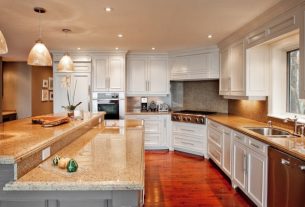Countertop materials are now getting popular for kitchen renovation. Its hard and solid properties make it ideal for creating contemporary designs for your kitchen. If you plan to choose concrete kitchen worktops in your home, this article is for you.
Installing Concrete Worktops
Concrete worktops look similar to huge slabs. However, their real thickness is only about 1 ½ up to 2 inches. The illusion that it creates is due to its drop-front edging on the worktop. They are weighty countertops with about 19 – 25 lbs./sq2.
During the installation process, the installers require to reinforce cabinetry to stand with its large weight. Most of these concrete worktops are likely formed and at the same time poured on-site. On the other hand, some technicians fabricate it on shops to get the exact measurement of the space of your kitchen and discuss the finish selections with you.
Typically, these worktop slabs are reinforced using metal mesh or fiber mesh for rigidity and strength upon the fabrication. Then, it can be fully cured, and the surface can be polished with the finish of your choice. The application of sealer, mostly hard epoxy is done after the fabrication. As the finishing and curing are done, a team of installers will deliver the worktop carefully on the worksite and install it.
On the installation, the team can make support frames for sinks since it can’t carry the sinking weight. The countertops are attached to the cabinets using construction adhesives that is shimmed and leveled carefully.
Pros and Cons of Concrete Worktops
Concrete is a premium and high-end material, so you must make sure that your kitchen countertops are installed only by experts. It needs experience and skill for its perfect installation. To know more about concrete kitchen countertops, the following are its advantages and disadvantages.
Advantages
- It can be customized based on your needs. You can custom it based on the space measurement of your kitchen.
- It can offer you a long-lasting and durable surface.
- It doesn’t easily scratch and has strong resistance against heat.
- You can embed other materials like stones, fiber-optic lights, shells, and glass fragments on your kitchen countertop.
- The surface of your concrete kitchen worktop is easy to maintain and clean. You can also make regular sealing to prolong its beautiful design and efficiency.
- The concrete countertops are ideal for enhancing real estate value because of its luxury lifestyle connotations.
Disadvantages
- One downside of kitchen countertops is that it is a little bit costly. It can range up to $150 per square foot.
- It requires yearly sealing to prevent staining.
- The weight of the countertops can strain floors as well as cabinet frames.
- Another downside of it is that it is prone to cracks. There are some instances that repairs are impossible.
Maintenance of your Concrete Kitchen Countertops
If the countertop is sealed using a premium-grade epoxy sealer, you only need to apply a good quality water-based wax sealer for maintenance after every nine to twelve months. Sealing it every year can improve its resistance against stains and cracks.




